Want to try campervanning in Spain but not sure what to expect? Fret not, I’ve got you covered!
After two years of full-time van travel in Spain and Portugal, we do get a lot of questions about campervanning and motorhoming in Spain. Especially because at the time being we haven’t even fixed her up. “She” is Persistence, the van. Among friends, she goes as Persi.
If you are planning to explore vanlife, Spain is a lovely destination. Especially because there are so many hidden gems in Spain that are best explored by van or car.
But let’s be honest, having your own bed and kitchen rolling along with you, you can literally set camp anywhere. Or can you?
There are rules about campervanning in Spain that you should know before you head out on your adventure so that you don’t get any unpleasant surprises. Especially when it comes to where you spend the night and for how long you can set up camp.
Knowing the rules and making sure you leave no trace by following sustainable tourism practices, takes you a long way.
We have learned a lot just by staying in different places around Spain, both in cities and in nature, and will share it all in this post.
Disclosure: This post may contain affiliate links. That means that if you make a purchase through one of those links, I will get a small commission at no extra cost to you.

Hi, I’m Linn Haglund, the face behind Brainy Backpackers. I’ve been based in Spain for the last 10+ years, and travel locally and abroad whenever I have a chance. I’m passionate about responsible travel, slow and off the beaten path travel, and outdoor activities, especially hiking. I’m currently slow traveling in my van Persistence (Persi among friends) with my fiancée Mohammed and rescue puppy Atlas. I’m excited to help you explore this planet responsibly!
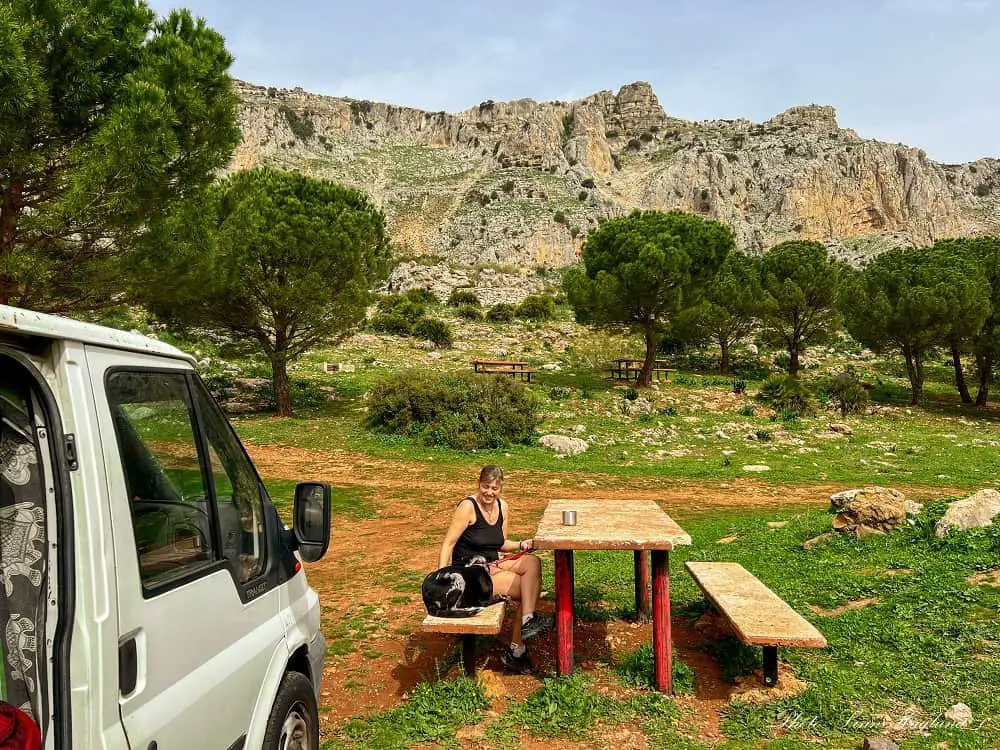
MORE VAN LIFE CONTENT
- Essential van life accessories
- Pros and cons of van life
- Van life with dogs
- How to make money living in a van
- Pros and cons of raising a van life puppy
- How to start van life with no money
👉JOIN OUR FACEBOOK GROUP FOR SPAIN AND PORTUGAL TRAVEL TIPS!
Best time for campervanning in Spain
Spain is far enough south in Europe so you can easily tour all year round in a campervan. Spain is diverse, though, seasons vary from place to place. Different seasons have different advantages and I would say some have their cons too, so I’ll go through the seasons here.
Winter in Spain is mild in the south and cold in the north and in higher altitudes. That makes it better to stay by the coast and south in the country when campervanning or motorhoming Spain during the winter.
The winter months get more rain than the rest of the year too, but if you work online while traveling in a van, you can use rainy days as work days.
The summer months are the hottest and also the most crowded. August is especially crowded when most Spanish take their vacation. Particularly on the coastal destinations.
In my experience, a lot of places set up signs prohibiting campervans from parking in beach towns and near beaches in the summer which is a bit of a bummer. Particularly in Andalucia, but altogether, it’s something we notice in overtouristed areas.
If you travel by van in Spain during the summer, you’ll want to stay near the coast or head to the rivers and ravines chasing waterfalls to cool down.
Due to the restrictions spreading to more and more beach destinations over the last few years, I found it more pleasant to spend the summer months in the mountains and explore off the beaten path. There are plenty of lakes, rivers, and waterfalls where you can cool down and campervans and RVs are welcome.
The most pleasant times of the year to visit Spain are spring and fall when temperatures are mild in most places and the summer crowds are gone.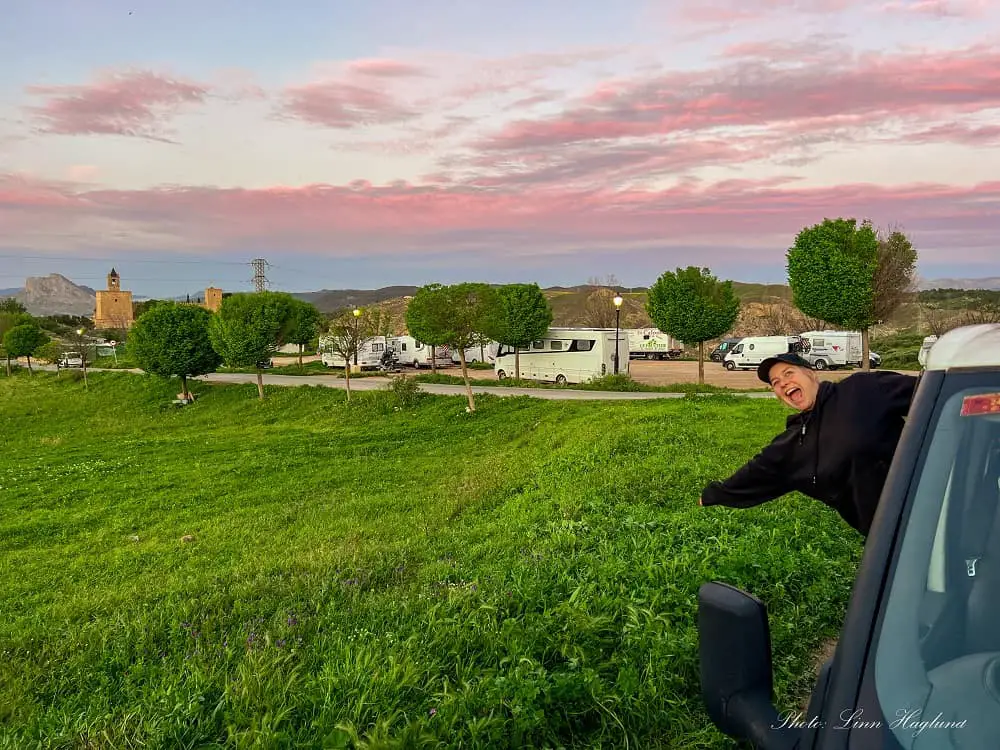
Tips for campervanning in Spain
Day Parking
Parking for the day when visiting cities and towns is easy if you have a small van. But once you travel with a longer vehicle, you need to look up RV parking.
Many cities in Spain have dedicated caravan parks within walking distance from the city. However, others don’t.
We like to use the app Park 4 Night even when looking for free daytime parking around cities. Even though Persi (the van) is small and fits in normal car parking spots, the app is useful.
There are usually reviews of the parking space and we like to check if there are many others that have experienced robbery when parking there. Those parking areas are best to avoid.
This is usually only something we have seen in bigger cities (Valencia, Barcelona, Seville etc.) We also find it easier to park in a smaller town outside the city sometimes and take the train into the bigger city for the day.
An example is when we visited Barcelona for a day, we parked in Vilanova I La Giltru and took the train in. There, we knew the van would be safe, and we saved ourselves a lot of hassle driving into Barcelona where we probably would have had to take some sort of public transport to get to the center anyway.
Smaller towns, on the other hand, are usually well equipped with (often free) caravan parking where you can stay the day or even the night. Some of them have facilities like water and toilet dumping, while others don’t.
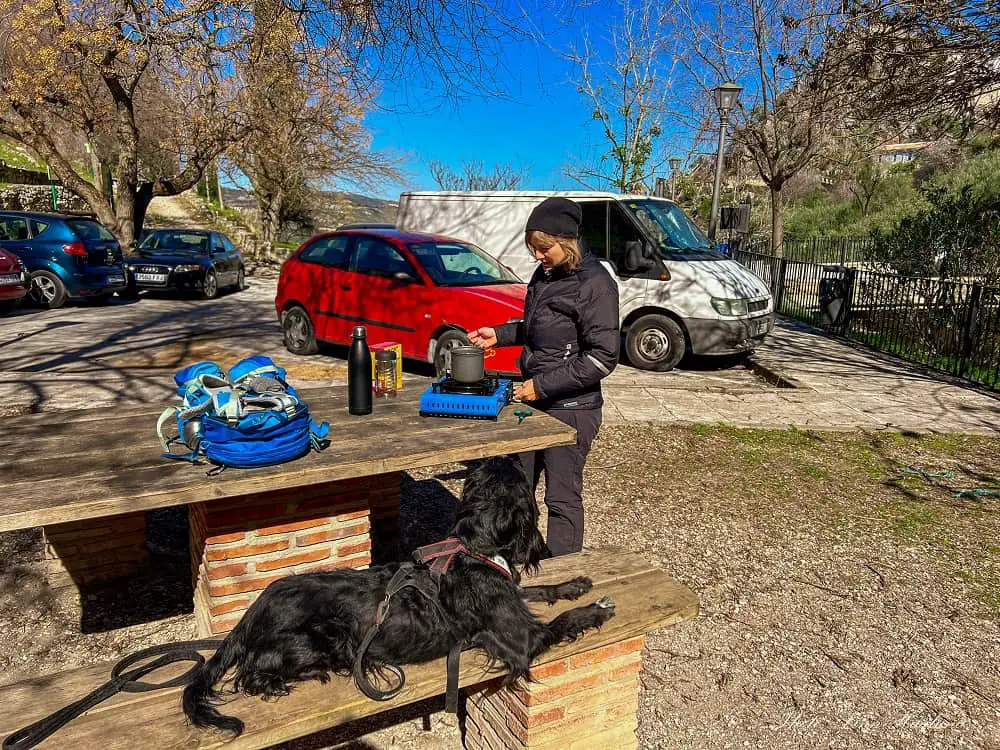
Places that don’t welcome RVs and camper vans
Unfortunately, some areas like Nerja in Costa del Sol, don’t welcome caravans at all! We’ve seen an increase in places that have set up signs that RVs are not allowed to park anywhere in the town which means not even for the day.
While it is a way to control overtourism, I find it incredibly hostile to not allow parking altogether. For us, it’s not a problem because Persi (the van) looks like an old working van so there’s nothing indicating that anyone lives inside and we can also park in any street with other cars without being spotted.
But if you drive a larger vehicle, you’ll have to skip the destination and look for another place to visit.
I won’t list up places here, since we’ve noticed more and more places, so I believe it’s a trend now, especially in Andalucia’s coastal towns. There might be local Facebook groups where you can find information when you go.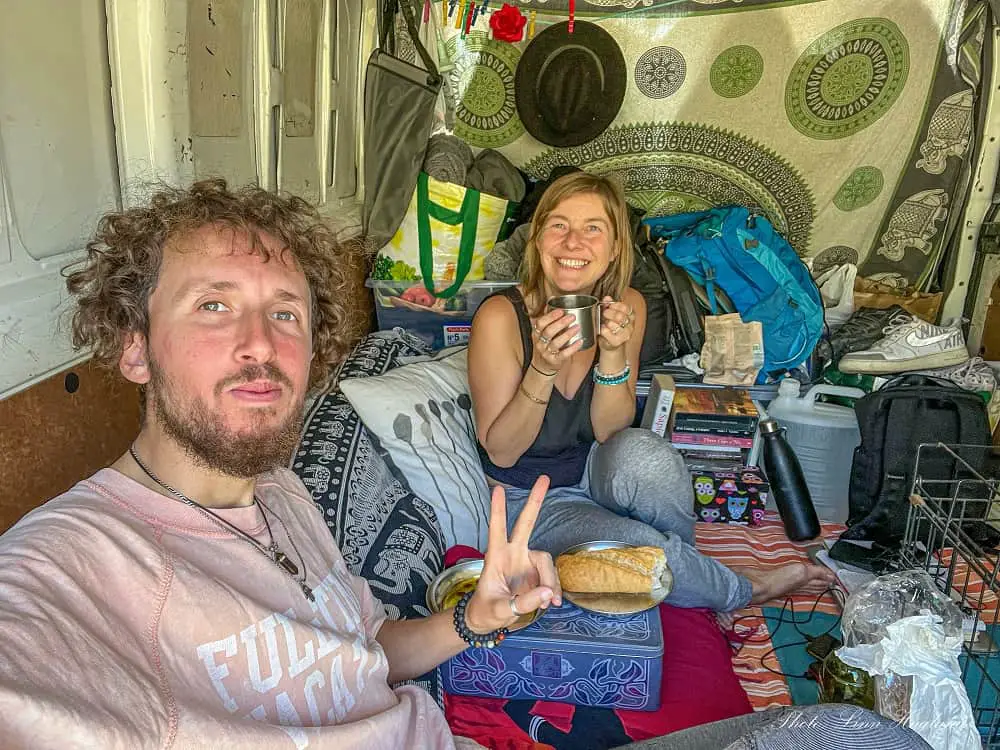
Camping grounds
There are plenty of camping grounds where you can spend the night and have access to showers and bathrooms which is super useful if you travel like us – very simple.
Most larger campgrounds have space for RVs to park and are super convenient whether you spend a night or stay longer.
Free overnight parking – Park 4 Night
As I touched on earlier, there are often caravan parking areas around cities and towns across Spain. But not all. We have come across three different types of these which I’ll list here.
- Free caravan parking area with water access and toilet dumping. Some even have free toilets. No time restrictions.
- Free caravan parking area with water and toilet dumping with signs allowing up to 72 hours of parking.
- Paid caravan parking area with water and toilet dumping (we haven’t stayed in any of these as we basically can park anywhere due to Persi’s size.)
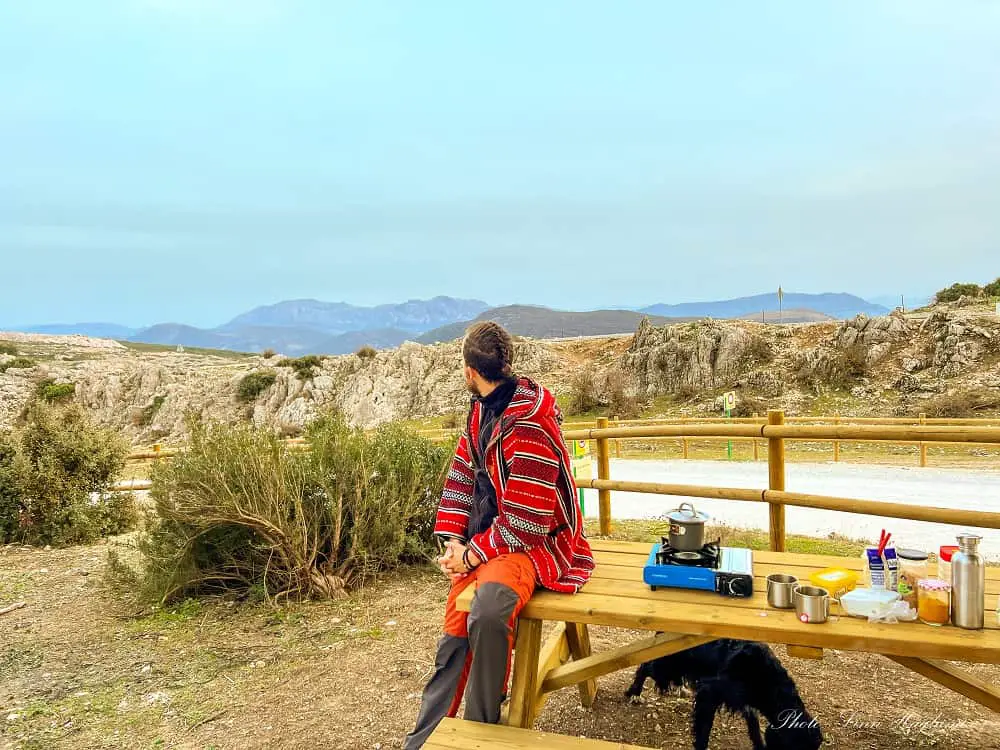
Wild camping in Spain in a motorhome or van
Wild camping is illegal all over the country, including camping by RV or campervan in Spain. The rules are hard to read up on and to truly understand, but in short, you can sleep the night but not take anything outside the RV or van like chairs and table etc. This includes the free caravan parking areas that are provided by towns and cities.
This said, there are always people that do so and I’ve only heard about and seen the police telling travelers to take their things inside but never actually fining them. But who knows how long that lasts!
As I’m writing this, we’re parked in the caravan park in La Cala de Mijas in Costa del Sol and I’d say about 50% of the caravans here have tables and chairs outside while enjoying a beer or reading a book.
Keep this in mind also if you decide to park your RV in nature. Many places have signs that you can’t sleep there in a campervan or RV overnight. But we have stayed in some epic places, usually “Areas Recreativas” where there are picnic tables you can use.
We feel safer about staying in a place in nature if we see other vans parked there, yet the important message here is to not set up camp outside the vehicle.
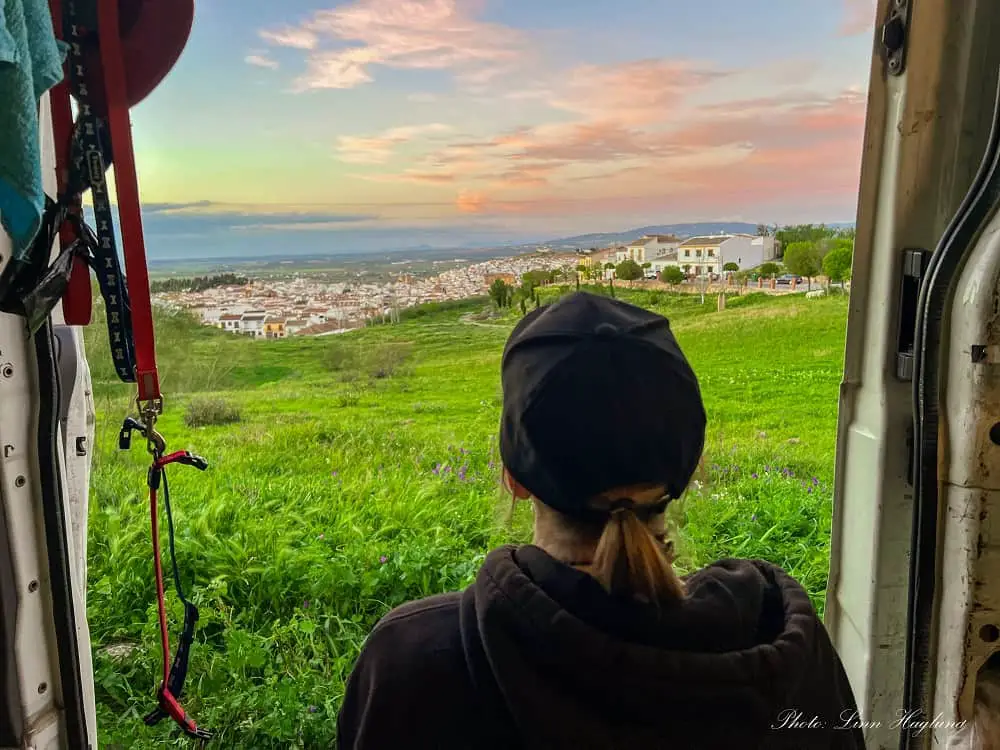
Toll roads
There are plenty of toll roads in Spain. You can save yourself a lot of money, especially in the summer months when toll prices go up, by taking the scenic route to avoid the toll roads.
Saying this, I’ve noted one very annoying thing with my Google Maps GPS, she automatically sends me on the toll road. When I change to the longer scenic route, she will change it back for me as I’m driving.
This can be deceiving if you don’t know exactly where to drive and obviously not safe to start clicking on it while driving.
Useful apps
There are plenty of useful apps for van life these days. Here are the ones I find the most useful for van life in Spain
- Park4Night: Find the best places to park paid or free daytime or overnight with reviews.
- Google maps: Find the best driving route to your destination. I also like to look for places to visit on the map that are nearby, it’s a great way to find hidden gems in Spain!
- El Tiempo: The most used weather app in Spain – accuracy is disputable but I haven’t found anything better either.
- Wikiloc: The most used hiking app in Spain, you’ll find just about any route there, and for only about 10 Euros a year, you can download trails and record trails on the app.
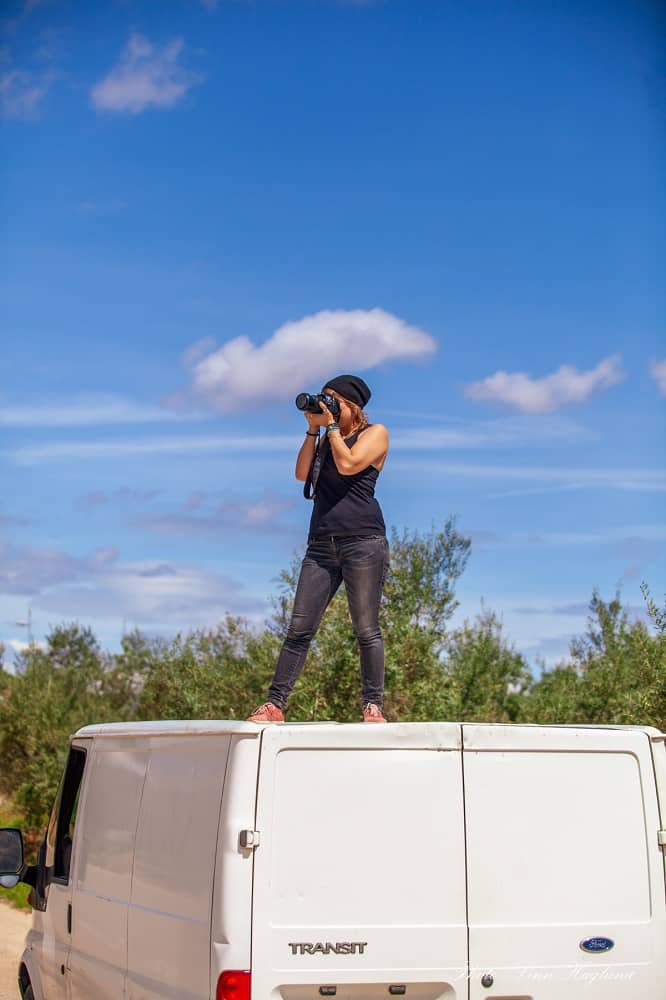
Driving license and driving a foreign campervan or motorhome in Spain
Make sure you check upfront if you need an International driver’s license to drive in Spain before you go.
Most residents of EU or EEA countries can use their local driving licenses for driving in Spain, but some have restrictions for up to 6 months.
For US residents, it’s necessary with an International driving license together with a US driving license.
If you go on a European campervan trip from the UK with a UK-registered motorhome or campervan, you need to display a UK sticker on the rear of your vehicle.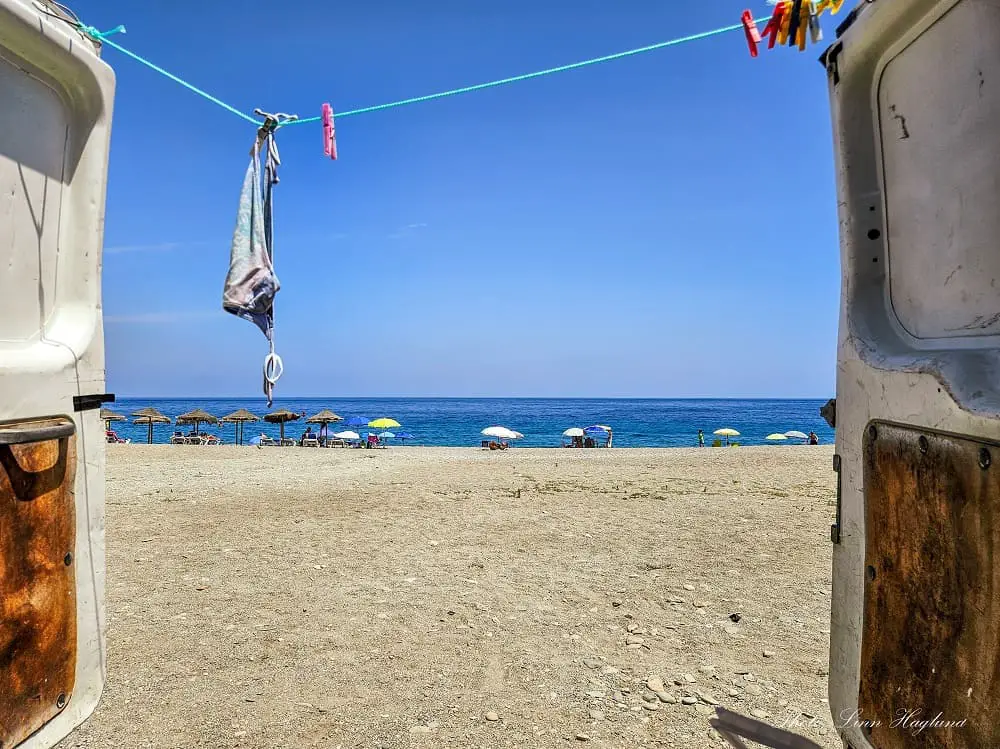
Van rental Spain
If you’re looking for campervan rental, Spain has a few companies operating, some are better than others. Indie Campers are super popular and I’ve got friends and family that have used them both in Spain and Portugal and were very happy with it.
Most important rules to know when motorhoming in Spain
Here are the main rules for driving in Spain which are useful to know when campervanning and motorhoming in Spain.
- You drive on the right side of the road
- Overtaking can only be done on the left side of the car you want to pass
- It’s illegal to talk on the phone without a hands-free device (headphones are not allowed) while driving
- The alcohol limit is 0.5
Read more about driving in Spain as a tourist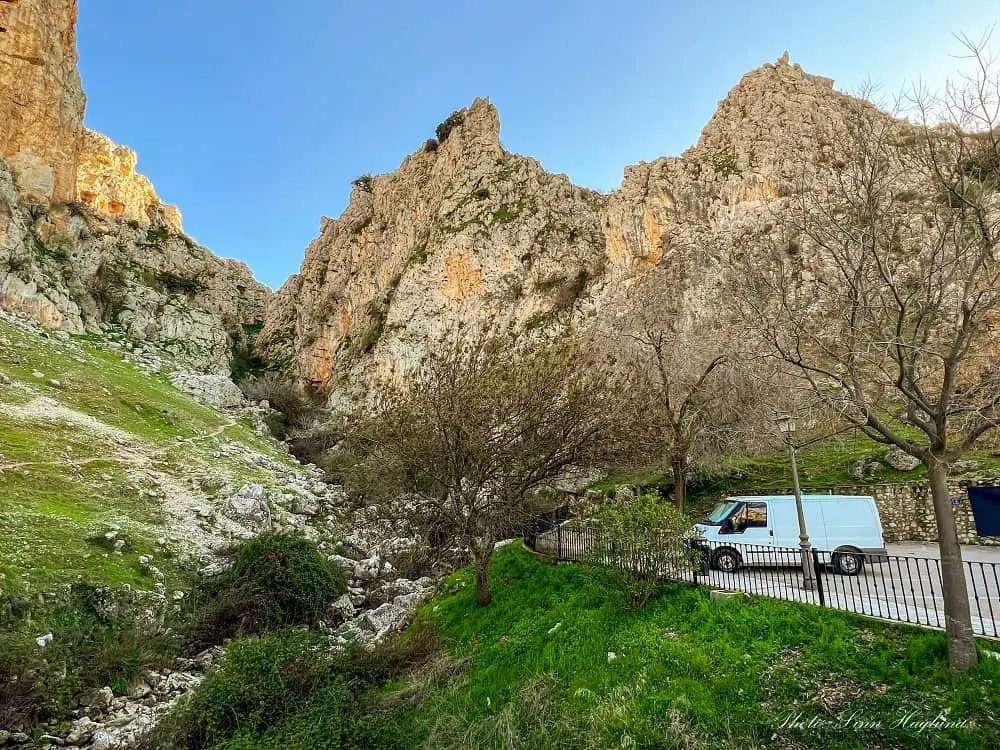
Summing up van life Spain
When considering the van life, Spain is a great destination. Though there are some regulations, as long as you know them, you’re about to have a great time!
If you should get stopped by police for anything, in my experience, a smile and friendly tone of voice gets you a long way.
With wonderful nature and beautiful cities and towns, van life in Spain is a true bucket list experience.
Happy travels!
